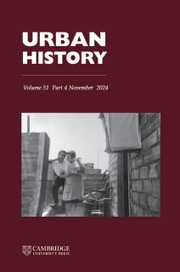No CrossRef data available.
Article contents
Navigating the discourse of planning history: insights for urban historians from the 20th IPHS biennial conference, Hong Kong, China
Published online by Cambridge University Press: 01 September 2025
Abstract
The 20th biennial conference of the International Planning History Society (IPHS) was held in Hong Kong, China. Through a comprehensive analysis of the keynote speeches, panel presentations, roundtable discussions, excursions and IPHS awards, this report highlights key insights from the conference that are especially relevant to urban historians. It suggests that planning history not only acts as a tool for informing urban strategies but also offers critical perspectives on socio-political, environmental, and cultural dimensions of urban transformation. The report presents three key insights for urban historians: (1) the entangled planning histories of Hong Kong and Shenzhen reflect broader political, ideological and international ambitions of dominant powers; (2) the evolution of environmental histories when rethinking human–natural relations in urban transition; and (3) the emerging attention to marginalized voices and alternative archives to enrich dominant planning narratives. These together demonstrate how planning history offers a critical historiographical lens for interpreting urban transformation.
Information
- Type
- Meeting Report
- Information
- Copyright
- © The Author(s), 2025. Published by Cambridge University Press
References
1 R.L. Rego, ‘20th IPHS biennial conference report’, Planning Perspectives, 39 (2024), 1417–25. https://doi.org/10.1080/02665433.2024.2388710.
2 C.L. Chu, Building Colonial Hong Kong: Speculative Development and Segregation in the City (London, 2022).
3 Dr Chen Yixin is the former deputy chief planner of the Planning and Natural Resources Bureau of Shenzhen Municipal People’s Government. She also served as the director of the planning of the Futian CBD.
4 This presentation was based on J. Mariotti and K. Leetmaa, Urban Planning during Socialism: Views from the Periphery (London, 2023).
5 Ian Morley, one of the organizers of the 20th IPHS biennial conference, repeatedly highlighted their institutional recognition of women scholars during the conference chats.


